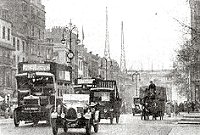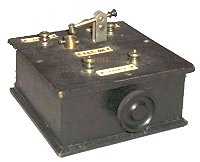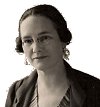BBC Radio History 1922-1939  |  |  | Sir John Reith: first BBC Manager | Arthur Burrows; first BBC voice | Peter Eckersley: first BBC Engineer |
This is 2L0 Calling... The London Station of the BBC Calling... 
| 2LO Masts Selfridges London 1925 |
The BBC was formed 18th October 1922 with John Reith as General Manager. His vision for radio in Britain was that it should an independent broadcaster able to educate, inform and entertain. The first official BBC radio broadcast was the evening news transmitted by London station 2L0 from Marconi House studios on the Strand, Central London. The date was November 14th 1922 and the voice was that of the Programme Director Arthur Burrows. Programmes were initially broadcast for just an hour each day with a break every seven minutes. '2LO' was the reference of the radio broadcasting license issued by the Post Office. The 1.5kW medium wave transmitter was built by the Marconi Wireless Telegraph Company and situated at the top of Marconi House. At the time just 30,000 radio licences were held. By the end of 1924 eight other medium wave stations had opened in cities around the UK. Each of these broadcast locally produced programmes. A new relay station was opened each month to allow reception in surrounding areas. In 1925 the London masts were moved to a new more powerful transmitter at Selfridges, Oxford Street where they remained until 1929. 
| Typical 1920's Crystal Set Receiver |
Morning BBC programmes during the later 1920's included The Daily Service at 10.15 AM, followed by Gramophone Records. Afternoon shows consisted of the BBC Dance Orchestra, 'A Light Classical Concert', Children's Hour at 5.15 PM (a show which was to remain for 40 years), and a short documentary about the Royal Horticultural Society. In a typical evening one could hear the BBC Dance Orchestra , a documentary about dressing the waxwork models at Madame Tussaud's, a half-hour variety show with folk songs and a BBC Promenade concert. Time signals (pips) could be heard on the half-hour and no morning news bulletins were heard at all. By 1926 over 2 million radio licences were in use, the same year John Reith ordered all announcers to wear evening dress to match BBC performing artists. National and Regional Programme The Geneva Frequency Plan of 1926 halved the number of medium wave frequencies available to countries in Europe, so between 1927 and 1937 the BBC replaced the original lower power local transmitters and relays with six high power 'regional' medium 
| Emma Barcroft 'Aunty Dorothy' on Children's Hour 1924-35 |
wave transmitters; one to serve Wales, four serving England and Northern Ireland plus one for Scotland, each offering local opt - outs from the new National Programme. To help fill in areas of poor reception an experimental long wave transmitter was set up at Daventry, Northamptonshire in 1925 enabling the BBC in 1930 to broadcast the new National Programme to the majority of the population. These transmissions were moved to Droitwich, Worcestershire in 1934, (now used to broadcast Radio 4). During the 1930's short plays, organ music, seaside songs and the news at 6.00pm were introduced on the National Programme. The daily Children's Hour remained at 5.15. The long running Saturday night show In Town Tonight began in 1933. Hundreds of interesting personalities were interviewed in London during the shows 27 year run including actors, stunt men, magicians, detectives, traders and even Princes! The decade saw commercial competition from overseas broadcasters such as Radio Normandie and Radio Luxembourg. These were especially popular on Sundays when the BBC's output consisted of Bible Readings, Religious Talks, the Epilogue, and a Daily Service. In 1939 with World War II looming, the BBC laid emergency plans to continue a service of broadcasting during this critical time. Next |